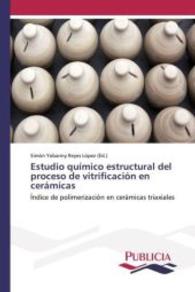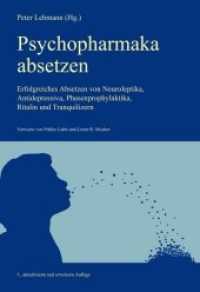Full Description
This collection offers a holistic overview of disciplinary literacies (DLs) in English-medium higher education (EME), with chapters employing a wide range of methodological approaches and data sources to illustrate the importance of a focus on DLs in facilitating positive outcomes for student learning.
The volume puts explicit emphasis on DLs within the context of EME, here understood as the skills and resources necessary for developing complex disciplinary knowledge, particularly in light of increased globalization and the internationalization of high-pressure academic and professional environments. The book takes a tripartite perspective, exploring the perspectives of students, lecturers, and teacher educational developers. This approach allows for a better understanding of both lecturers' and students' views on DLs, the classroom practices employed in the teaching and learning of DLs, and ways forward for enhancing teacher professional development programs to raise greater awareness of subject-specific needs and in turn, the significant role DLs can play in setting up students for success in and beyond the classroom.
This book will be of interest to students and scholars in applied linguistics, TESOL, teacher education, and language education, as well as stakeholders in teacher education development programs.
Contents
Part I: Setting the scene - 1. Disciplinary Literacies in English-medium higher education: An Introduction - Davinia Sánchez-García and Ariadna Sánchez-Hernández; 2. Ways forward in understanding Disciplinary Literacies in English-medium higher education - Emma Dafouz, Julia Hüttner and Ute Smit; Part II: DLs in the classroom: Lecturer and student perspectives and practices - 3. "So far, we haven't had to write very much. It's all been multiple choice." Lecturer and student (emerging) perspectives on disciplinary literacy development in English-medium business programs - Emma Dafouz, Miya Komori-Glatz and Pat Moore; 4. How do students acquire disciplinary literacy? Student and teacher perspectives from master's courses in the life sciences at a French university - Susan Birch-Becaas and Joanne Pagéze; 5. Making room for biliteracy development in EME programmes: Business and economics students' perceptions and self-reported practices - Irene Soriano-Flórez; 6. The impact of academic year on EME business students' views on disciplinary literacy - Elena Orduna Nocito; 7. Extramural English and English-medium education: A binational survey of bachelor students' views on their academic disciplinary practices - Katharina Ghamarian-Krenn, Verena Grau and Ute Smit; 8. International peer collaboration in group work: Language quality, agency, and problem-solving - Maria Kuteeva and Kathrin Kaufhold; 9. A discipline-based analysis of language needs and challenges encountered in the Turkish EMI context - Dogan Yuksel and Mehmet Altay; 10. Disciplinary biliteracy among Latiné undergraduates in engineering and computer science - Alberto Esquinca and Lidia Herrera Rocha; Part III: Teacher professional development and DLs in English-medium education - 11. Localising experiences of EME development: Accommodating disciplinary oracy at a Swiss bi- and multilingual university - Iris Schaller-Schwaner; 12. Creating synergy in teaching disciplinary literacies in Australian teacher education - Zuocheng Zhang; 13. A plurilingual genre-based approach to academic writing: Guidelines for disciplinary literacy-oriented teacher training in higher education - Guzmán Mancho-Barés, Sarah Khan and Alexandra Vraciu; 14. The elusive notion of disciplinary literacy in a cross-disciplinary context: A purloined letter of sorts - Magnus Gustafsson; 15. Navigating disciplinary literacies in search of beacons and shipping routes: A coda - Christiane Dalton-Puffer.








